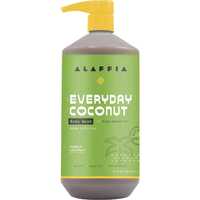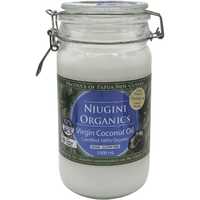When you talk about health products, there's nothing quite as versatile as the coconut. Both a delicious food and a useful beauty product, coconut has many uses and is available in multiple forms. From drinking coconut water and cooking with coconut milk to using coconut oil on your skin, this unique fruit has a range of diverse applications.
Let's take a closer look at the coconut, including its ecological footprint, nutritional benefits, and health properties. We'll also look at how coconut can be used so you can incorporate this wonderful product into your daily life.
Interesting Facts About Coconuts
The coconut tree is part of the palm tree family, and it's one of the most naturally widespread fruit trees on the planet. The scientific name of the coconut tree is Cocos nucifera, and it's the only species in the palm tree family Arecaceae. The modern "coconut" and archaic "cocoanut" are both derived from the old Portuguese and Spanish word "coco," which means "head" or "skull."
There are two distinct forms of the coconut fruit: niu kafa and niu vai. The former has a triangular or oblong shape, and the latter is rounded. Coconut trees have a similar lifespan to human beings, living for around 90 years and producing fruit from 10 to 80 years old. There are two types of coconut trees, with tall and dwarf plants both used for food and cosmetics, along with folk medicine, fuel, and building materials.
Despite their name, coconuts are not nuts but drupes, which is a type of stone fruit. The delicious fruits of the coconut tree are mostly harvested by climbing, with a less efficient pole method also used in some situations. Indonesia is the world's largest coconut producer at around 15 million tonnes, followed by India and the Philippines.
History of Coconut Use
Coconut trees are often associated with tropical islands, and for very good reason. Most domesticated coconut trees are native to Southeast Asia and the islands dotted between the Indian and Pacific oceans. There's also another sub-population of coconuts that originated from the southern part of the Indian subcontinent. Today, coconuts grow in a number of tropical climates, from Africa and Latin America to northern Australia and southern Florida.
Coconuts played an important role in Austronesian migration, as they provided a portable source of both food and water. As ancient Austronesians established trade routes to Madagascar and coastal Africa from 3000 to 1500 BCE, Pacific coconuts started to spread around the world. Indian coconuts spread much later, with these trees making their way to Portugal before being transported to the New World during the colonial period.
Are Coconuts Ethical and Eco-friendly?
Coconuts are very eco-friendly, with a relatively low water footprint and minimal carbon footprint. There are very few ethical problems linked with coconuts, as they're largely sustainable and have little impact on the natural environment. However, coconut farm workers in some nations are easily exploited, and monkeys are sometimes used for harvesting in Thailand. Purchasing fair trade or organic coconut products helps to avoid these potential issues.
The Nutritional Profile of Coconuts
Thanks to their health benefits, coconuts have enjoyed a recent resurgence. They're a great source of healthy fats, proteins, and fibre, and they contain essential minerals such as iron, manganese, copper, and magnesium. Coconuts have small amounts of B vitamins, but they're relatively low in most other vitamins.
Coconuts have the following nutritional profile, per 100 g. DV stands for Daily Value:
- Protein - 3 g
- Carbohydrates - 15 g
- Fats - 34 g
- Fibre - 9 g
- Sugars - 6 g
- Manganese - 1.5 mg or 65% of DV
- Copper - 0.5 mg or 48% of DV
- Selenium - 10 mg or 18% of DV
- Iron - 2.5 mg or 14% of DV
- Phosphorus - 113 mg or 9% of DV
- Magnesium - 32 mg or 8% of DV
- Potassium - 356 mg or 8% of DV
The Health Benefits of Coconuts
Coconuts are associated with a variety of health benefits. Depending on how they're prepared, these versatile fruits can be consumed as food or used in topical applications. Along with being highly nutritious, the following benefits are among the most noteworthy:
Antibacterial properties
Coconuts have antibacterial properties, with coconut oil found to block the growth of certain bacteria strains. According to one study, virgin coconut oil helped to inhibit the growth of Staphylococcus aureus, which is the type of bacteria that causes staph infections. Coconut has also been found to reduce the growth of Streptococcus mutans and inhibit two common bacteria strains associated with food-borne illness.
Lots of antioxidants
Coconut meat, which is the name given to the white "flesh" of the coconut, contains a number of phenolic compounds, including gallic acid, caffeic acid, salicylic acid, and p-coumaric acid. These compounds function as antioxidants, which help to protect cells from oxidative damage. Coconut meat has been found to neutralise free radicals and protect against DNA damage.
May help with blood sugar
Coconuts are high in fats and fibre while being low in carbohydrates. This healthy profile provides a range of benefits when it comes to blood sugar control, with one study suggesting links between coconut consumption and lower blood sugar levels. The anti-inflammatory and antioxidant properties of coconuts may be responsible for this effect, and the high fibre content may help to slow digestion and improve insulin resistance.
Great for skin and hair
Not only is coconut great when consumed, but it's also beneficial when rubbed on your face, body, and hair. Virgin coconut oil has been used as a moisturiser for hundreds of years, and it's present in lots of modern beauty products. The topical application of coconut oil promotes anti-inflammatory activity, improving skin barrier function and protecting against UV damage.
According to one study, virgin coconut oil could be useful in treating skin disorders like dermatitis and eczema. It also helps to prevent protein loss in hair, and was found to outperform both mineral and sunflower oil for this purpose. Coconut oil is full of lauric acid, with this medium-chain fatty acid easily absorbed into the hair shaft. Whether you want coconut oil for hair or skin, there are lots of great commercial products available.
How are Coconuts Used?
If anything matches the health benefits of coconut, it's the incredible versatility of this wonderful fruit. There are numerous ways to consume it, from pure liquid products to creams, oils, and meat. Amazingly, almost the entire coconut plant can be used for something, which makes it a waste-free product. The following uses are common:
Coconut water
The pure liquid found inside fresh immature coconuts is incredibly delicious. Younger coconuts are tastier — just chop the top of the shell for a natural drink and container combo. Depending on the season, drinkable coconuts can be found in supermarkets and health food stores, with bottled and canned products available all year round.
Coconut oil
Coconut oil has captured the world's attention in recent years, with this healthy oil used for cooking, oral health, and skin care, among other things. Coconut oil comes from dried coconut meat, and it's available in the following formats: cold-pressed oil, refined oil, virgin oil, raw oil, unrefined oil, and organic oil. Virgin coconut oil, preferably organic, is the best for your health, and it also has the most obvious coconut flavour.
Coconut milk and cream
Despite different names, coconut cream and coconut milk are pretty much the same. Coconut milk is made by grating fresh coconut flesh and blending it with water, with coconut creams just using less water. These products are included in many Asian dishes, and they can also be used to replace dairy milk and cream. For this reason, coconut milks and creams are a big favourite among vegans.
Coconut meat
The white "flesh" of the coconut is often called coconut meat, but it's officially known as copra. Coconut meat is great to eat, and it's also used to make coconut oil and flour. This delicious and highly nutritious white material is often consumed as desiccated coconut, which is grated or flaked to remove as much water as possible. Along with its natural form, coconut meat is a regular addition to health food products and chocolates.
Other uses for coconut
As mentioned above, every part of the coconut plant can be used for something. Coconut husks are great for ropes, doormats, and brushes. Coconut leaves are used for decorations and brooms, and coconut shells make incredibly beautiful bowls. In addition, coconut roots make a useful mouthwash or dye, coconut flowers can be used to make alcohol or vinegar, and coconut trunks are useful as firewood. Last but not least, coconut shells are often used for Foley sound effects, where they closely resemble the sound of a horse's hoofbeats.
If you would like to add more coconut and coconut-rich foods to your diet or beauty routine, Healthy Being has what you need. We have coconut oils, cooking products, beauty care items, hair products, and so much more. So check out our website today for thousands of products at heavily discounted prices. Shop now and enjoy free shipping options across Australia and worldwide delivery!


 Certified Organic
Certified Organic Vegan Friendly
Vegan Friendly  Vegetarian
Vegetarian Organic Ingredients
Organic Ingredients Dairy Free
Dairy Free Gluten Free
Gluten Free Keto Friendly
Keto Friendly































